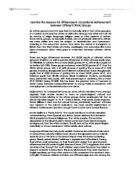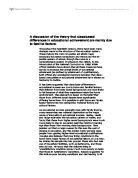By its very nature the eleven plus looked at student’s academic skills completely ignoring student’s personal abilities. Whereas in the education systems of Germany and Japan, in the same period, the majority of students took a vocational path in order to secure educational success. Perhaps this is why their societies achieved greater industrial and economic accomplishment (Abercrombie, Warde Contemporary British Society 1994 pg. 350). Equally, successful entry to a grammar school was not guaranteed if the student had passed their eleven plus exam, this was due to the limited number of places. If we compare the number of grammar schools in Surrey, (which is known for its large percentage of upper and middle class), to the number in the industrial Midlands (with its high population of working class), there is proportionally less number of places for students, therefore making the educational system largely a postcode lottery.
It is sighted in Plummer’s ‘Failing Working Class Girls’, that not only did grammar schools have better teachers but also superior buildings and resources-
An overwhelming proportion of working class children were being educated in elementary schools. Their inferior buildings and resources, lack of graduate teachers and limited curriculum, compared badly with the better resourced secondary grammar and fee paying schools, attended mostly by children from middle class backgrounds. (Plummer 2000 pg. 15).
From the 1960’s onwards, education was increasingly measured in terms of economics i.e. as an institution of national interests rather than personal fulfilment. During this period racial and ethnic minority groups entered the debates, due to immigration becoming more prevalent. It was assumed that children coming from these backgrounds needed to become like the white populous as quickly as possible therefore little genuine progress was made (Finch, 1984). Perhaps this is due to the nature of the curriculum for example, history lessons concentrating on white European perspective with often-fanciful representations of ethnic cultures. Equally teachers and local authorities did not understand their growing presence in schools and it emerged that in some schools, Head teachers were refusing to admit more black pupils (Donald and Rattansi, ‘Race’, Culture and Difference, 1992 pg. 14). Professor John Rex, a leading figure in British Race Relations Research, accused ‘black youth’ of being “arrogant, rumbustious and contempurious” and having “…a certain fascination for violence”. (Rex, New Debates in Black Politics 1990 pg. 18 and 33). It’s hardly surprising that these students felt marginalised. In addition under achievement of ethnic groups appeared to be over looked-
…many of the teachers indicated they had never considered seriously the apparent failure or under achievement of working class or black children in the education system. (Lee, Pride and Prejudice; Teachers, Class and an Inner City Infants School, 1987 pg. 108).
Girls coming from an ethnic minority are not the only group held back from achieving their full potential – equally white girls coming from middle class backgrounds feel this. Even today, the dominant (arguably unconscious) ideologies to reinforce cultural norms of gender behaviour (Walker and Barton, 1983); both pupils and staff give these norms in schools. Girls are not expected to do as well, are not brought up to be \assertive to the same level as their male counterparts, and therefore tend to underachieve and blame themselves for it (Light and Dwek, 1987). Staff praise different qualities. Until very recently girls choices in curriculum activities were limited, they were encouraged to veer away from scientific or technical subjects; Deem 1978 sights girls examination result successes tend to be in art subjects, which have limited value for entry into employment and therefore lead females down a different route in further education. The format of exams themselves and other measures of curricular achievement are biased towards males e.g. multiple choice tests are geared towards ‘male logic’ than ‘female’ abilities. Issues such as these highlight the importance that moves are made to alter prejudice expectations and the way assessments are undertaken; including educating teachers to understand their own biases, promoting a change in the expectations of girls so they can achieve what is really within their interests and capabilities.
Another area in which the education system is failing today is the treatment of those to be deemed as special needs. The 1988 Education Act defined this by ‘learning difficulty that calls for special educational provision to be made’. This definition obviously makes some comparison with a ‘norm’, this norm is not specified and different education authorities have different averages. Although steps are being taken to move away from labelling since the 1983 Warnock Report many such pupils are still educated separately within schools themselves or special schools together, this again becomes a self-fulfilling prophecy. Barton and Tomlinson (1981) ask, ‘ at which point does caring become controlling?’ this is due to current attitudes that problems are psychological, rather than social and pupils are categorised.
Despite the promises of the 1940’s Act and the many worthwhile reports that have been commissioned (and largely ignored), still the education system in Britain is riddled with inequalities as set out above. The education system has lost its focus on personal fulfilment. Arguably the pupil has become a homogenised asset to be utilised in the interest of economic progress. If the child does not meet this criteria then they are virtually excluded to protect the accepted norms that society seeks to reinforce on tomorrow’s world.
In the ideal situation school children will learn a variety of skills throughout their schooling, to aid his or hers development to achieve their full potential. By the time a young person leaves school at whatever age suits their abilities and aspirations, they should be a self confident and fulfilled individual. Each individual should have gained a wealth of knowledge, motivation for further development, life skills and exam success, which realistically reflects their capabilities. Equally a pupil should have had the opportunity to form friendships with peers and to have built relationships with teaching staff, thus providing a positive image of society at all levels. Everyone should have been exposed to new ideas and activities. This is an ideal; how many people having experienced the British Education system would relate their own schooling to this statement? For many this statement is totally alien to their experiences due to the inherent prejudices the institution reinforces such as the class structure, racism, sexism, beaurocracy and commercialism of schools.
It is evident that British schooling has changed considerably since 1945, in many ways there has been great improvement for the majority of pupils. However still today there are a significant group covering ethnic minorities, girls and Special Educational Needs pupils who have largely been over looked so far. If Britain is to make the most from its human resources it is vital that attitudes change so that the individuals’ potential, which is currently ignored, may be fulfilled.
Bibliography
Miller, J., 1992, More Has Meant Women: The Feminisation of Schooling, Institute of Education and London: Tufnell Press
Parsons, T., 1995, Haralambos, M & Holborn, M., Sociology Themes and Perspectives. Fourth edition. London: Collins Educational
Abercrombie, N & Warde, A., 1994, Contemporary British Society. Second Edition. Cambridge: Blackwell Publishers.
Plummer, G, 2000, Failing Working Class Girls. Stoke-On-Trent, Trentham Books.
Finch J., 1984,’Its Great To Have Someone To Talk To’: The Ethics and Politics of Interviewing Women’, in C. Bell and Robert (eds) Social Researching: Politics, Problems, Practice, London: Routledge and Kegan Paul.
Donald J., Rattansi A,.1992, ‘Race’ Culture & Difference, London, Sage Publications.
Rex J., 1990, Debates in Black Politics, Warwick, Warwick University.
Lee, J., 1987, Pride and Prejudice: Teachers, Class and an Inner City Infants School, in m. Lawn and G. Grace (eds) Teachers: The Cultural and Politics of Work, Lewes: Falmer Press
O’Donnell G., 1985, Mastering Sociology, Basingstoke, The Macmillan Press.
Pugh, M,. 1994, State & Society A Social and Political History of Britain 1870-1997, London, Arnold Publishers.
Other Sources:
Campaign for Real Education web-site – www.cre.org.uk
Word Count 1,691







